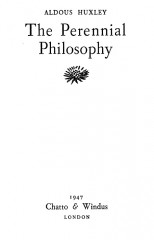
Author : Huxley Aldous (Huxley Aldous Leonard)
Title : The Perennial Philosophy
Year : 1946
Link download : Huxley_Aldous_-_The_Perennial_Philosophy.zip
PHILOSOPHIA PERENNIS the phrase was coined by Leibniz ; but the thing the metaphysic that recognizes a divine Reality substantial to the world of things and lives and minds ; the psychology that finds in the soul something similar to, or even identical with, divine Reality; the ethic that places man's final end in the knowledge of the immanent and transcendent Ground ofall being the thing is immemorial and universal. Rudiments of the Perennial Philosophy may be found among the traditionary lore of primitive peoples in every region of the world, and in its fully developed forms it has a place in every one of the higher religions. A version of this Highest Common Factor in all preceding and subsequent theologies was first committed to writing more than twenty-five centuries ago, and since that time the inexhaustible theme has been treated again and again, from the standpoint of every religious tradition and in all the principal languages of Asia and Europe. In the pages that follow I have brought together a number of selections from these writings, chosen mainly for their significance because they effectively illustrated some particular point in the general system of the Perennial Philosophy but also for their intrinsic beauty and memorableness. These selections are arranged under various heads and embedded, so to speak, in a commentary of my own, designed to illustrate and connect, to develop and, where necessary, to elucidate. Knowledge is a function of being. When there is a change in the being of the knower, there is a corresponding change in the nature and amount of knowing. For example, the being of a child is transformed by growth and education into that of a man ; among the results of this transformation is a revolutionary change in the way of knowing and the amount and character of the things known. As the individual grows up, his knowledge becomes more conceptual and systematic in form, and its factual, utilitarian content is enormously increased. But these gains are offset by a certain deterioration in the quality of immediate apprehension, a blunting and a loss of intuitive power. Or consider the change in his being which the scientist is able to induce mechanically by means of his instruments. Equipped with a spectroscope and a sixty-inch reflector an astronomer becomes, so far as eyesight is concerned, a superhuman creature; and, as we should naturally expect, the knowledge possessed by this superhuman creature is very different, both in quantity and quality, from that which can be acquired by a stargazer with unmodified, merely human eyes. Nor are changes in the knower's physiological or intellectual being the only ones to affect his knowledge. What we know depends also on what, as moral beings, we choose to make ourselves. Practice,' in the words of William James, may change our theoretical horizon, and this in a twofold way : it may lead into new worlds and secure new powers. Knowledge we could never attain, remaining what we are, may be attainable in consequence of higher powers and a higher life, which we may morally achieve. To put the matter more succinctly, Blessed are the pure in heart, for they shall see God.' And the same idea has been expressed by the Sufi poet, Jalal-uddin Rumi, in terms of a scientific metaphor : The astrolabe of the mysteries of God is love. This book, I repeat, is an anthology of the Perennial Philosophy; but, though an anthology, it contains but few extracts from the writings of professional men of letters and, though illustrating a philosophy, hardly anything from the professional philosophers. The reason for this is very simple. The Perennial Philosophy is primarily concerned with the one, divine Reality substantial to the manifold world of things and lives and minds. But the nature of this one Reality is such that it cannot be directly and immediately apprehended except by those who have chosen to fulfil certain conditions, making themselves loving, pure in heart, and poor in spirit. Why should this be so ? We do not know. It is just one of those facts which we have to accept, whether we like them or not and however implausible and unlikely they may seem. Nothing in our everyday experience gives us any reason for supposing that water is made up of hydrogen and oxygen; and yet when we subject water to certain rather drastic treatments, the nature of its constituent elements becomes manifest. Similarly, nothing in our everyday experience gives us much reason for supposing that the mind of the average sensual man has, as one of its constituents, something resembling, or identical with, the Reality substantial to the manifold world; and yet, when that mind is subjected to certain rather drastic treatments, the divine element, of which it is in part at least composed, becomes manifest, not only to the mind itself, but also, by its reflection in external behaviour, to other minds. It is only by making physical experiments that we can discover the intimate nature of matter and its potentialities. And it is only by making psychological and moral experiments that we can discover the intimate nature of mind and its potentialities. In the ordinary circumstances of average sensual life these potentialities of the mind remain latent and unmanifested. If we would realize them, we must fulfil certain conditions and obey certain rules, which experience has shown empirically to be valid. ...

Palmer Michael - Hiroshima revidiert
Author : Palmer Michael Title : Hiroshima revidiert Die beweise für napalm und senfgas anstatt...














